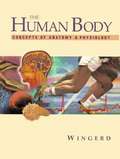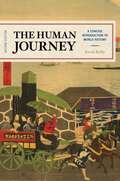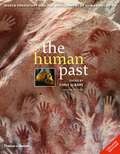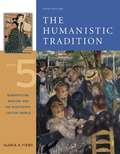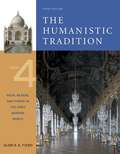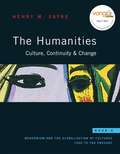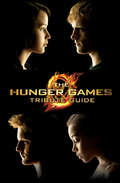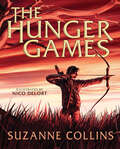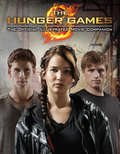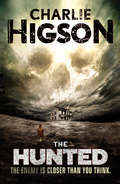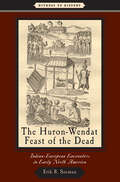- Table View
- List View
The House Servant's Directory: An African American Butler's 1827 Guide (American Antiquarian Cookbook Collection)
by Robert Roberts"In order to get through your work in proper time, you should make it your chief study to rise early in the morning; for an hour before the family rises is worth more to you than two after they are up."So begins Robert Roberts' The House Servant's Directory, first published in 1827 and the standard for household management for decades afterward. A classic survey of work, home life, and race relations in early America, the book was the result of many years of Roberts' personal and professional experiences. One of the first books written by an African-American and published by a commercial press, this manual for butlers and waiters offers keen insight into the social milieu, hierarchy, and maintenance of the antebellum manor.As a servant to a prominent New England family, Roberts provided valuable insights into what was expected of domestic servants. His book contains an abundance of instructions for successfully completing household chores as well as suggestions for properly cleaning furniture and clothing; and for buying, preparing, and serving food and drink for dinner parties of all sizes (much of which is still useful information today). The text also contains suggestions for arranging servants' work routines, and advice to heads of families on how best to manage their domestic help -- extraordinary recommendations for master-servant relationships and highly unusual for the time.Among the most famous of etiquette books to provide instruction on proper behavior for domestic servants in the early nineteenth century, Roberts' Directory remains a critical primary source in sociology and African-American history.
The House at Pooh Corner: Illustrated By Ernest H. Shepard (The Winnie-the-Pooh Collection)
by A. A. MilneWith a gorgeously redesigned cover and the original black and white interior illustrations by Ernest Shepard, this beautiful edition of the beloved sequel to Winnie-the-Pooh by A. A. Milne, The House at Pooh Corner, is sure to delight new and old fans alike!Pooh and Christopher Robin&’s escapades in the Hundred Acre Wood continue! Piglet, Eeyore, and other familiar friends encounter the energetic Tigger for the first time, whose bounce first, think later personality brings new excitement. With more Heffalump hunts and funny moments in store, each chapter is a new adventure!
The House of Velvet and Glass
by Katherine HoweKatherine Howe, author of the phenomenal New York Times bestseller The Physick Book of Deliverance Dane, returns with an entrancing historical novel set in Boston in 1915, where a young woman stands on the cusp of a new century, torn between loss and love, driven to seek answers in the depths of a crystal ball.Still reeling from the deaths of her mother and sister on the Titanic, Sibyl Allston is living a life of quiet desperation with her taciturn father and scandal-plagued brother in an elegant town house in Boston's Back Bay. Trapped in a world over which she has no control, Sybil flees for solace to the parlor of a table-turning medium.But when her brother is suddenly kicked out of Harvard under mysterious circumstances and falls under the sway of a strange young woman, Sibyl turns for help to psychology professor Benton Jones, despite the unspoken tensions of their shared past. As Benton and Sibyl work together to solve a harrowing mystery, their long-simmering spark flares to life, and they realize that there may be something even more magical between them than a medium's scrying glass.From the opium dens of Boston's Chinatown to the opulent salons of high society, from the back alleys of colonial Shanghai to the decks of the Titanic, The House of Velvet and Glass weaves together meticulous period detail, intoxicating romance, and a final shocking twist in a breathtaking novel that will thrill readers.Bonus features in the eBook: Katherine Howe's essay on scrying; Boston Daily Globe article on the Titanic from April 15, 1912; and a Reading Group Guide and Q&A with the author, Katherine Howe.
The House of the Scorpion (The House of the Scorpion)
by Nancy FarmerDiscover this internationally bestselling, National Book Award–winning young adult classic about what it means to be human with an updated, reimagined cover!Matt Alacrán wasn&’t born. He was harvested. His DNA came from El Patrón, the drug-lord ruler of the country of Opium. Most people hate and fear clones like Matt—except for El Patrón. El Patrón loves Matt as he loves himself, because Matt is himself. As Matt struggles to understand his existence, he is threatened by a sinister cast of characters, and realizes escape is his only chance to survive. But escape from the Alacrán Estate is no guarantee of freedom.
The House on Yeet Street
by Preston NortonA hilarious ghost story about a group of thirteen-year-old boys whose friendship is tested by supernatural forces, secret crushes, and a hundred-year-old curse. When Aidan Cross yeeted his very secret journal into the house on Yeet Street, he also intended to yeet his feelings for his best friend, Kai, as far away as possible. To Aidan&’s horror, his friends plan a sleepover at the haunted house the very next night. Terrance, Zephyr, and Kai are dead set on exploring local legend Farah Yeet&’s creepy mansion. Aidan just wants to survive the night and retrieve his mortifying love story before his friends find it. When Aidan discovers an actual ghost in the house (who happens to be a huge fan of his fiction), he makes it his mission to solve the mystery of Gabby&’s death and free her from the house. But when Aidan&’s journal falls into the wrong hands, secrets come to light that threaten the boys&’ friendship. Can Aidan embrace the part of himself that&’s longing to break free…or will he become the next victim to be trapped in the haunted house forever? Perfect for tweens who enjoy books for kids 10-12, The House on Yeet Street blends supernatural thrills with humor in this fresh twist on ghost stories for young readers. Fans of mystery books for middle schoolers will love unraveling the secrets haunting Yeet house, while also connecting to the relatable friendship dynamics and coming-of-age themes.For those who love scary books but prefer their frights balanced with fun, The House on Yeet Street delivers a unique mix of spooky encounters and laugh-out-loud moments that will keep readers eagerly turning the pages.
The Houses of History: A Critical Reader in Twentieth-century History and Theory
by Anna Green Kathleen TroupEvery piece of historical writing has a theoretical basis on which evidence is selected, filtered, and understood. This is as true of scientific empiricism as it is of poststructuralism. The Houses of History provides a comprehensive introduction to the twelve schools of thought which have had the greatest influence on the study of history in the twentieth century. Ranging from Empiricism to Postcolonialism, Marxism to the Ethnohistorians, each chapter begins with an introduction to the particular school, the main protagonists, the critics, and is followed by a useful section of further readings. From the classic, such as G.R. Elton's "England Under the Tudors" and E.P. Thompson's "The Making of the English Working Class," to the recent, such as Henrietta Whiteman's "White Buffalo Woman" and Judith Walkowitz's "City of Dreadful Delight," the diverse selections collected here bring together the leading historians and theorists of the century. Comprehensive and accessible to undergraduates,The Houses of History is ideally suited to classroom use.
The Housing Boom and Bust: Revised Edition
by Thomas SowellScary headlines and scarier statistics tell the story of a financial crisis on a scale not seen in decades--certainly not within the lifetime of most Americans. Moreover, this is a worldwide financial crisis. Financial institutions on both sides of the Atlantic have either collapsed or have been saved from collapse by government bailouts, as a result of buying securities based on American housing values that eroded or evaporated. Now completely revised in paperback, The Housing Boom and Bust is designed to unravel the tangled threads of that story. It also attempts to determine whether what is being done to deal with the problem is more likely to make things better or worse.
The Hug
by David Grossman Stuart Schoffman Michal Rovner“You are sweet,” Ben’s mother tells him as they walk in the field at sunset, “There is no one like you in the entire world!” “I want there to be someone like me!” Ben exclaims, for if he is the only person like himself in the entire world, he wonders, won’t he get lonely? In The Hug, internationally renowned author David Grossman tells the moving story of the moment when Ben realizes that no two living creatures are alike—not his mother and father, their beautiful dog Miracle or the ants who march side by side at his feet and appear identical—and the loneliness he feels knowing that there is no one else quite like him in the whole world. But just as he is feeling the most alone he has ever felt, he is soothed by his mother’s loving hug. Timeless, touching, and beautifully produced, The Hug is a charming and important work for parents and children encountering the feeling of being different, together
The Human Body: Concepts Of Anatomy And Physiology
by Bruce D. WingerdThis text is developed specifically for the one-term market and offers the essentials of anatomy and physiology in a direct, concise format. Students benefit from striking and precise full-color art that enhances the author's straightforward, clear writing style. The author's vast teaching experience enables him to accurately present the appropriate vocabulary and detail that an allied health/physical education major needs.
The Human Experience: A Recitation Manual for Anthropology (2nd edition)
by Andrew Balkansky Robert Corruccini Meghan HarrisonSupplementary text for anthropology classes.
The Human Journey: A Concise Introduction to World History
by Kevin ReillyThe Human Journey offers a truly concise yet satisfyingly full history of the world from ancient times to the present. The book’s scope, as the title implies, is the whole story of humanity, in planetary context. Its themes include not only the great questions of the humanities—nature versus nurture, the history and meaning of human variation, the sources of wealth and causes of revolution—but also the major transformations in human history: agriculture, cities, iron, writing, universal religions, global trade, industrialization, popular government, justice, and equality. <P><P>In each conceptually rich chapter, leading historian Kevin Reilly concentrates on a single important period and theme, sustaining a focused narrative and analytical perspective. Chapter 2, for example, discusses the significance of bronze-age urbanization and the advent of the Iron Age. Chapter 3 examines the meaning and significance of the age of “classical” civilizations. Chapter 4 explains the spread of universal religions and new technologies in the postclassical age of Eurasian integration. But these examples also reveal a range of approaches to world history. The first chapter is an example of current “Big History,” the second of history as technological transformations, the third of comparative history, the fourth the history of connections that dominates, and thus narrows, so many texts. Free of either a confined, limiting focus or a mandatory laundry list of topics, this book begins with our most important questions and searches all of our past for answers. Well-grounded in the latest scholarship, this is not a fill-in-the-blanks text, but world history in a grand humanistic tradition.
The Human Past: World Prehistory and the Development of Human Societies
by Chris ScarreTextbook on humans, from 6 million years ago to early civilizations.
The Human Record: Sources of Global History - Since 1500 (Seventh Edition)
by Alfred J. Andrea James H. OverfieldTHE HUMAN RECORD is the leading primary source reader for the World History course, providing balanced coverage of the global past. Each volume contains a blend of visual and textual sources which are often paired or grouped together for comparison. A prologue entitled "Primary Sources and How to Read Them" appears in each volume and provides background and guidance for analyzing sources such as those in the text. Approximately one-third of the sources in the Seventh Edition are new, and these documents continue to reflect the myriad experiences of the peoples of the world.
The Humanistic Tradition Book 5: Romanticism, Realism, and the Nineteenth-Century World
by Gloria K. FieroThe Humanistic Tradition explores the political, economic, and social contexts of human culture, providing a global and multicultural perspective which helps students better understand the relationship between the West and other world cultures.
The Humanistic Tradition, Book 4: Faith, Reason, and Power in the Early Modern World (Fifth Edition)
by Gloria K. FieroThis book focuses on the creative legacy referred to collectively as the humanities: literature, philosophy, history (in its literary dimension), architecture, the visual arts (including photography and film), music, and dance.
The Humanities: Modernism and the Globalization of Cultures, 1900 to the Present
by Henry M. SayreThe Humanities by Henry M. Sayre helps the reader see the context and make the connections across the humanities by tying together the entire cultural experience through a narrative storytelling approach.
The Humble Essay (Second Edition)
by Roy K. HumbleThis composition textbook introduces college writing in everyday language so that non-majors are more likely to actually read these chapters, understand the ideas, and then put those ideas to good use.
The Hunger Games Tribute Guide: Tribute Guide (The\hunger Games Ser.)
by Suzanne Collins Emily SeifeThe New York Times bestselling Hunger Games is now a major motion picture -- and here is the ultimate guide to the all the tributes in the 74th annual Hunger Games!Here is the ultimate guide to the twenty-four Tributes participating in Panem's 74th annual Hunger Games. Follow the Tributes' journey from the Reaping to the Games, with a look at all the highlights along the way--the Tribute Parade, the stations of the Training Center, the interviews, and more. Get exclusive information about the Tributes' strengths and weaknesses, their weapons of choice, and their experience in the Capitol before entering the arena.
The Hunger Games Trilogy: The Hunger Games, Catching Fire, and Mockingjay (The Hunger Games #1 - 3)
by Suzanne CollinsThe stunning Hunger Games trilogy is complete! The extraordinary, ground breaking New York Times bestsellers The Hunger Games and Catching Fire, along with the third book in The Hunger Games trilogy by Suzanne Collins, Mockingjay, are available for the first time ever in e-book. Stunning, gripping, and powerful.
The Hunger Games: Illustrated Edition (The Hunger Games)
by Suzanne CollinsTHE HUNGER GAMES as you've never seen it before -- in a remarkable illustrated edition.Even at the age of sixteen, Katniss Everdeen knows it takes hard work, keen observation, and inner fortitude to survive in the world. Her home, District 12, is under the merciless rule of the Capitol, continually forced to pay after losing a long-ago civil war in the nation of Panem.One of the ways the Capitol keeps control is its annual Hunger Games, a televised fight to the death featuring two young tributes from each of Panem's twelve districts. This gruesome battle is meant to send home a chilling message: Rebellion will always be punished.When Katniss finds herself within the Hunger Games arena, she knows the odds aren't in her favor. Any wrong move will end her life -- and even the right moves come with a cost. But if she can survive, there is a chance the districts may survive as well... The Hunger Games has enthralled millions of readers in its examination of the price of war, human nature, and the powerful force of both love and resistance. Now it appears for the first time in a deluxe illustrated edition, with spellbinding art from internationally acclaimed artist Nico Delort.
The Hunger Games: Official Illustrated Movie Companion (The\hunger Games Ser. #2)
by Suzanne Collins ScholasticThe New York Times bestseller by Suzanne Collins is now a major motion picture -- and this is your guide to all of the movie's excitement, both in front of the camera and behind it.Go behind the scenes of the making of The Hunger Games with exclusive images and interviews. From the screenwriting process to the casting decisions to the elaborate sets and costumes to the actors' performances and directors' vision, this is the definitive companion to the breathtaking film.
The Hunger Inside: How the Meal Jesus Gave Transforms Lives
by Bradley RothThe meal that Jesus of Nazareth gave his followers, celebrated with grand liturgy and golden chalice, or words pared lean and tiny plastic cups, is the distinctive rite of the church. The Eucharist is regarded as the source and summit of Christian faith—or maybe just a symbol—but what all Christians know is that Holy Communion does something. It's what and how the supper does what it does that divides us.In The Hunger Inside, Brad Roth explores the myriad ways the Lord's Supper transforms lives. As on that ancient gospel hill where more than 5,000 hungry people were fed, the abundance of Jesus' table touches uncountable human stories. Drawing generously on eclectic theological traditions, Roth takes a narrative-driven approach to plumb the rich depths of symbolism, power, and presence communicated in the communion meal.This book is a call for all followers of Jesus to encounter again the One who meets our deepest hungers at his table.
The Hunted (An Enemy Novel #6)
by Charlie HigsonThe sickness struck everyone sixteen and older. First it twisted their minds; next it ravaged their bodies. Now the sickos roam the streets, crazed and hungry for young flesh. Ella's friends had told her that the country would be safer than the city. They were wrong. Now they're dead and Ella's all alone--alone, that is, except for her silent rescuer, Scarface. But she doesn't even know if he's a kid or a grown-up.Back in London, Ed is determined to find Ella and keep his promise to Small Sam that he will reunite sister and brother. But getting out of town has never been more dangerous. It seems that every sicko in the country is coming from all directions, almost as if they're being summoned to the capital. Will anything be able to stop the invading horde?
The Huron-Wendat Feast of the Dead: Indian-European Encounters in Early North America (Witness to History)
by Erik R. Seeman"Two thousand Wendat (Huron) Indians stood on the edge of an enormous burial pit... they held in their arms the bones of roughly seven hundred deceased friends and family members. The Wendats had lovingly scraped and cleaned the bones of the corpses that had decomposed on the scaffolds. They awaited only the signal from the master of the ritual to place the bones in the pit. This was the great Feast of the Dead."Witnesses to these Wendat burial rituals were European colonists, French Jesuit missionaries in particular. Rather than being horrified by these unfamiliar native practices, Europeans recognized the parallels between them and their own understanding of death and human remains. Both groups believed that deceased souls traveled to the afterlife; both believed that elaborate mortuary rituals ensured the safe transit of the soul to the supernatural realm; and both believed in the power of human bones.Appreciating each other’s funerary practices allowed the Wendats and French colonists to find common ground where there seemingly would be none. Erik R. Seeman analyzes these encounters, using the Feast of the Dead as a metaphor for broader Indian-European relations in North America. His compelling narrative gives undergraduate students of early America and the Atlantic World a revealing glimpse into this fascinating—and surprising—meeting of cultures.
The Hysterical Girls of St. Bernadette's
by Hanna AlkafFour starred reviews! An all-girls school is struck with mysterious cases of screaming hysteria in this dark academia &“thrilling mix of ghost story and realism&” (School Library Journal, starred review) haunted by a deeply buried history clawing to the light.For over a hundred years, girls have fought to attend St. Bernadette&’s, with its reputation for shaping only the best and brightest young women. Unfortunately, there is also the screaming. When a student begins to scream in the middle of class, a chain reaction starts that impacts the entire school. By the end of the day, seventeen girls are affected—along with St. Bernadette&’s stellar reputation. Khadijah&’s got her own scars to tend to, and watching her friends succumb to hysteria only rips apart wounds she&’d rather keep closed. But when her sister falls to the screams, Khad knows she&’s the only one who can save her. Rachel has always been far too occupied trying to reconcile her overbearing mother&’s expectations with her own secret ambitions to pay attention to school antics. But just as Rachel finds her voice, it turns into screams. Together, the two girls find themselves digging deeper into the school&’s dark history, hunting for the truth. Little do they know that a specter lurks in the darkness, watching, waiting, and hungry for its next victim…








